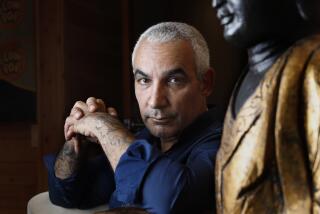Jury Holds Doctor Responsible in Epileptic’s Car Crash - Litigation: The $3.14-million award marks the first time a physician has been held accountable for damages caused by his professional negligence toward someone other than a patient.
- Share via
An El Cajon Superior Court jury Friday returned a “landmark” $3.14-million verdict against an East County neurologist in a case that asked how accountable a doctor should be when an epileptic patient gets behind the wheel of a car.
The verdict, against neurologist Mark C. Levine, was in favor of Sherril Altstadt, 25, of Newbury Park, who was paralyzed in an August, 1983, head-on, two-car crash on Coronado’s Silver Strand Highway.
Altstadt was a passenger in a car driven by Levine’s patient, Trudy Stevenson, an 18-year-old epileptic, who lost control of her car and ripped across the median into another auto, killing a 90-year-old retired Navy captain and injuring three people.
The verdict marked the first time a doctor has been held responsible for damages caused by his negligence toward someone other than his patient, said Altstadt’s San Diego attorney, Patrick Frega.
“I feel that justice was done, and it’s a landmark case,” Frega said. “The most important thing about it is that this jury sent a message. They sent a message to all doctors who treat seizure patients. They told them, ‘When your patient becomes a hazard to themselves and a menace on the highway, you must report them to the Department of Motor Vehicles.’ ”
The key factual issue in the case was whether Stevenson suffered an epileptic seizure that led to the crash--and the panel decided that a seizure did not occur, said Levine’s attorney, Robert W. Harrison of San Diego.
“Despite that conclusion, reached by a majority of the jurors, by at least nine, they nevertheless concluded that Dr. Levine shared some responsibility for the accident by virtue of the fact she was a licensed driver on that date,” Harrison said. “In effect, they would have imposed liability against Dr. Levine had she been a drunk driver, been in a drag race or had she been on drugs.”
Doctors and lawyers who specialize in medical malpractice issues had watched the case closely. A verdict against Levine, they feared, could open the door to a flood of expensive cases and a greatly diminished incentive to assist epileptics--and those with other disorders that may lead to blackouts, such as heart disease and alcoholism--gain a driver’s license.
But Harrison said that, because the jury returned a “logically inconsistent verdict,” the real message the case may send is that “doctors have infinite liability. Doctors who have patients with accidents under any circumstances may be facing liability exposure.”
Harrison said he would ask Superior Court Judge James Malkus to set aside the verdict. If that request is denied, he said he planned to appeal.
Levine, reached Friday at his home, declined comment on the verdict.
Physicians are required under state law to report immediately to county health officers all disorders involving “lapses of consciousness.” That information must be passed on to the DMV, the law says.
That law was at the center of the suit, which was filed in August, 1984, and in El Cajon because Altstadt, then known by her maiden name, Sherril Romero, used to live in nearby Santee. She sued both Levine and Stevenson, alleging negligence.
The DMV had issued Stevenson a probationary license in April 1981, with conditions that required her to report “adverse changes” in her condition. It issued the license after Levine filed a report about her the previous month.
Recurring Seizures
On Jan. 12, 1983, Stevenson was hospitalized with recurring seizures. Levine, Frega said, was required to report that “adverse change” within 10 days after Stevenson was released from the hospital but failed to do so.
That June, Levine told Stevenson she could drive, but only in emergencies or to work, Frega said. The accident occurred two months after that, on Aug. 28.
Harrison, Levine’s attorney, had contended that the January 1983 seizures were not any worse than previous ones but only more frequent, and thus did not qualify as an “adverse change.” Further, Harrison said, Levine faithfully followed all reporting requirements.
Although the jury awarded Altstadt the $3.14 million in actual damages, it did not award the punitive damages Frega had asked for.
The verdict also included a finding of negligence against Stevenson. She, however, had settled her share of the case before the verdict for $50,000, Frega said.
More to Read
Sign up for Essential California
The most important California stories and recommendations in your inbox every morning.
You may occasionally receive promotional content from the Los Angeles Times.










